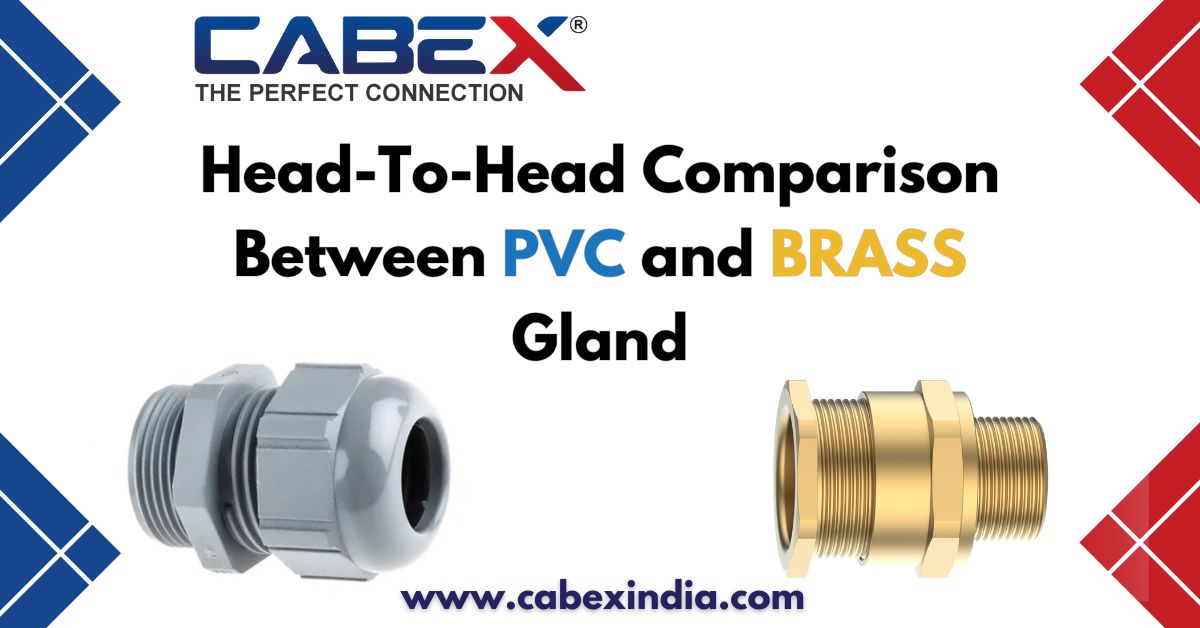While choosing materials for industrial, commercial, or residential use, knowing the difference between Brass and PVC Gland is important. Both have characteristics that make them suitable for specific applications, but both serve different purposes depending upon durability, cost, environmental conditions, and performance.This blog post will comprehensively compare Comparison Between Brass and PVC Gland, focusing on their advantages, applications, and suitability for various industries.
What Are Brass and PVC Gland?
- Brass: An alloy of copper and zinc, known for its strength, resistance to corrosion, and high electrical conductivity. Brass is widely used in plumbing, electrical fittings, and decorative applications.
- PVC (Polyvinyl Chloride): A versatile synthetic plastic polymer, valued for its lightweight, affordability, and resistance to chemicals and moisture. PVC is commonly used in piping, insulation, and construction materials.
Key Differences Between Brass and PVC Gland
1. Durability
Brass:
- Highly durable and resistant to wear and tear.
- Long-term usage in extreme conditions, such as high temperature and high pressure.
PVC:
- Less durable than brass but can be used in low-pressure applications and indoors.
- Can become brittle when exposed to extreme temperatures or UV rays for a long time.
2. Corrosion Resistance
- Brass: It is naturally corrosion-resistant, especially in marine or humid environments.
- PVC: Chemical corrosion resistant, making it suitable for transporting acidic or alkaline substances.
3. Cost
- Brass: Generally costlier due to its material composition and manufacturing process.
- PVC: Cost-effective and economical, making it perfect for budget-friendly projects.
4. Weight
- Brass: Heavier, meaning it provides strength and reliability in structural use.
- PVC: Lighter in weight, which makes its installation easier and also reduces shipping cost.
5. Applications
Brass:
- Plumbing fixings like valves and taps.
- Electrical components, such as connectors and terminals.
- Decorative items since it has a golden finish.
PVC:
- Water and sewage piping systems
- Insulation for electrical cable.
- Construction materials such as window frames and roofing sheets.
6. Environmental Impact
Brass:
- Environment-friendly since it is completely recyclable.
- High energy consumption for its production, which leads to a high carbon footprint.
PVC:
- Not easily recyclable and non-biodegradable, and hence poses an environmental hazard.
- Chemicals used in the manufacturing process can be hazardous to the environment.
Top 10 Brass and PVC Gland Advantages
Advantages of Brass
- High tensile strength for demanding applications.
- Has excellent corrosion resistance, particularly in humid or marine conditions.
- Superior thermal and electrical conductivity.
- Long-lived, thus low maintenance.
- Aesthetic appeal for decorative purposes
- Recyclable, hence eco-friendly.
- High pressure resistance, with applications in heavy-duty plumbing jobs
- Resistant to extremes of temperature without deformation.
- Complex components can be-obtained through precision manufacturing.
- The Automotive, Construction, and electrical industries are ideal clients.
PVC Advantages
- Lightweight, thus less hectic transportation and installation
- Cost-efficient for large-scale projects.
- Chemical corrosion resistant.
- Water and moisture-resistant piping and insulation.
- Can be molded into various forms with ease.
- Available in a wide range of colours for aesthetic flexibility.
- Fire-retardant properties improve safety.
- Non-conductive, hence minimising electrical risks.
- Low maintenance and easy to clean.
- Ideal for residential, commercial, and industrial purposes.
Applications of Brass and PVC Gland
Where Brass Excel
- Plumbing Systems: Durable under high pressure for long periods.
- Marine Equipment: It has a high resistance to corrosion and thus is suitable for saltwater conditions.
- Electrical Fittings: High conductivity, ensuring effective power transfer.
- Aerospace and Defense: It has high strength and can withstand extreme conditions.
- Decorative Items: Valued for its aesthetic look and polished appearance.
Where PVC Shines
- Light Weight Water And Sewage Pipes, resistance towards Chemical corrosion.
- Insulation; Doesn’t conduct electricity to its users, thereby protecting the systems
- Roofing and Windows; resistant to adverse weather conditions, durable to a structure,
- Chemical Transport, since not corrosive
- House Hold items, used in furnishing the home, toys, etc,
Packaging materials
Choose Brass if:
- Durability needs are high, applications include high pressure or heavyweight usage.
- Choose PVC in case of low-pressure requirements or light-weight applications
Budgetary Requirements:
- Use Brass for long-term returns; it is costlier initially.
- PVC is a cost-effective solution for large-scale projects.
Environmental Conditions:
- Use Brass in corrosive or high-temperature environments.
- Use PVC for chemical handling and indoor use.
Aesthetic Requirements:
- Brass is used for decorative and polished finishes.
- PVC can be coloured according to the design requirements.
Sustainability Goals:
- Brass is recyclable and eco-friendly.
- PVC has to be disposed of with caution due to its environmental impact.
Conclusion
Your needs should be considered in deciding between Brass and PVC Gland. Brass cannot be equaled when it comes to toughness, conductivity, and resistance to corrosion, and thus suits high-duty applications as well as decorative applications. PVC, conversely, is lightweight, less costly, and versatile; thus it suits piping, insulation, and building. Knowing their differences helps to select the right material according to your requirements, making the best possible choice regarding optimal performance, durability, and value for your particular application.
FAQs
Q1: Which is more durable, Brass or PVC?
A1: Brass lasts longer and is more durable, mainly in high-pressure and extreme situations.
Q2: Is Brass costlier than PVC?
A2: Yes brass is costlier as brass is made from its material and process involved in manufacturing is expensive.
Q3: Can PVC be utilized for plumbing?
A3: Indeed, PVC is used widely as water and sewage pipes; however, brass is relatively less durable when used with high pressure.
Q4: Is Brass Eco friendly?
A4: Yes, brass is fully recyclable and has a lower environmental impact compared to PVC.
Q5: Which is better for electrical applications?
A5: Brass is better for electrical applications due to its superior conductivity.
Follow us:- Facebook, Instagram
You May Also Like: Brass Cable Gland Manufacturer in India , Key Differences Between Aluminium and Brass Cable Glands






